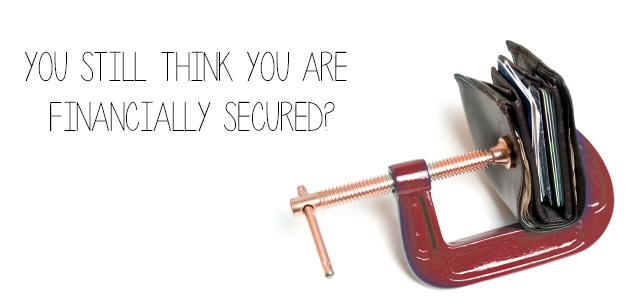Is your financial life secured because you have a well paying job for now or just because you can pay your bills on time you are well off? Think again, these 7 questions can be an eye-opener.
A lot of people often think that because they are relatively younger and earn a good amount of money, pay their bills, shop to their hearts content and splurge on things every now and then, they are well off. Such a situation leads a lot of us to think that we are finally settled financially and this is when you take your finances for granted. Your financial life may not be secure, but you will not realize it until it is too late because we are short term pleasure seekers. If we are well off for a year, we feel we are set for life. But it is not always the case.
In today’s world there is no concept of permanent long term jobs. Most of the jobs are contract based and even though your contract is being renewed year on year based on your performance, it is not a guarantee that it will continue that way. Your present may be financially secure, but your financial life may not be secured. There is a difference between the two. Financial life is a long term result of your present finances. Here is a small test that can tell if your financial life is secure or you need to buckle up and work towards it.

1. Is your job secured for the next 5 to 10 years?
If your answer is yes, because you are well educated, well qualified and virtually ‘in disposable’ and ‘irreplaceable’ by your current company then think again. What if there is recession where suddenly you are ‘over-qualified’ or ‘over-paid’ for your company and also the other companies? What if there will be a global slowdown in your industry, just like the global IT slowdown of the recent past.
Solution: Be realistic and evaluate your position in your company. Also take a realistic look towards your industry as a whole and be prepared of any eventuality if the time comes. While the going is good, make sure you invest sensibly and well, so that you have some steady second stream of finance flowing in the tough times, while you look for other opportunities.
If your answer to the above is NO, then start working towards developing an alternate skill set or upgrade your skills and keep evolving constantly so that you truly are in disposable.
2. Will you survive a job loss for 6 months?
Surviving 6 months without salary does not mean, merely having food to eat and a few bills to pay. It means being able to pay those EMIs, insurance premiums, continuing your ongoing investments etc; in short meeting all ‘essential’ outflows that you encounter each month while your job is on and salary intact. Cutting down essential expenses should only be an option when your job switch or job-hunt takes over 6 months in today’s scenario.
Solution: Keep a contingency fund parked in a separate account that you do not touch every now and then. When the going is great, keep depositing small amount to this account regularly and it should strictly be for the purpose of emergencies only, to keep you afloat for a period of 6 months.
3. Are your debts manageable if you lose your job?
How much is your total outflow towards EMI or credit card payments? Will you be able to pay all this if you lose your job all of a sudden?
Solution: Rather than a yes or a no, and apart from having a contingency fund for such hard times, your financial life can be secure, if you take on only those many liabilities, which you can ‘TRULY’ afford. A lavish house or a bigger car giving you a higher EMI is not ideal. Yes you can argue, your salary will increase, and then you can manage the EMI in the future. The thing is to live in the now and check your affordability. There are examples in the current scenarios where salaries have not been raised for over 2-4 years citing recession or other reasons. In such cases inflation eats up your current income and this is when you start to feel the burden of your ‘extra’ liabilities, be it credit cards or EMIs on car or home or otherwise.
4. Do you have more liabilities than assets?
The thing you should check here is your debts; your Home Loan EMI is towards building an Asset, which is your house, which may appreciate in value in the future, given the way our real estate markets work. However if you have EMI or credit card payments going on for everything else like cars, electronics, home appliances etc, then these are depreciating assets. Thanks to Zero % EMI schemes, people had bought a lot of stuff that they wouldn’t have otherwise and are now paying the EMIs for it. But these are mere liabilities that you are generating and not assets.
Solution: If you have monthly outflows for things like a Home Loan, Insurance Premium, Investments like SIP, PPF, Recurring Deposits etc, then you are fine, as these are towards building your financial assets that can appreciate and grow in value. However for things like car loans, credit card dues etc these are just outflows that are generating liabilities. Pay them off as quickly as possible. Even Home Loan should be paid off with regular pre-payments so that you are debt free sooner rather than later and can rest assure that your financial life is secured.

5. Do you often feel you spent a ‘little’ too much on ‘that’ thing?
Do you often feel that you ended up spending a bit more on that birthday party, or the grand wedding was just a bit too grand for your finances? Or that treat to the friends left a slightly bigger whole in your pocket? If you answer yes to any of these, them my friend your financial life is not secured. When you keep getting that feeling that you overspent, it means subconsciously you do know that you spent more that you should have. This habit will grow and you will soon see yourself spending more and more and for what! Just to show others that ‘hey look, I can afford this….”. But what when there is any financial crisis that you didn’t expect? Those ‘others’ will be the first to tell you that because you used to spend so much, this has happened to you.
Solution: It is always advisable to live within your means and spend a little less than you can. Spending habits soon become chains of your life style and this often leads to financial complications to the point wherein your savings are compromised and reduced.
6. How will your income grow 5 to 10 times in the next 10 years?
If you are thinking hard for this one, it could be a sign of your financial life not being secured. I know, no one can predict the future, but for that same reason, you should also keep a check on how you manage and more importantly spend your finances.
Solution: Plan ahead. Invest well and take steps to be sure of your future earning potential. It could be harnessing second set of skills, or like mentioned before upgrading your existing skills, an additional degree, anything that can set you well for your future. Do it now. It takes a few years before you can really become a pro in your new endeavors.
7. Do you have a ‘Plan B’ to keep your finances flowing?
After considering all of the above, still do you have any other way to earn if your current occupation were to not last longer. A lot of streams prefer younger professionals at some point in time. You may think, when such a thing happens in your company, you will be promoted or will be experienced enough to handle those younger people. But be realistic about your prospects, because at times there will be tougher competition from the younger lot, and at that point your salary will be higher than them and they may be more productive than you; whom will the company favor in that case? Also after a certain point in your career and your age, job hunting can get tougher.
Solution: Always have a backup income and if not already then at least start working towards it to make sure your financial life is secured. It could be anything, from your hobby to a new business idea anything, but you need to start working and developing it now in order to generate a passive income, that can be increased over a period of time and eventually can be your backup option.
By now you may have already been introspecting about your finances. The idea of this post is to help you realize that no matter what we do, there are things that are not in our hands. Recession, job losses, change of company policies, shifting to newer methods etc, need you to be constantly on your feet both in terms of updating yourself professionally as well as keeping track of your financial progress. Make sure to keep asking yourself the above questions at least once in a year and hopefully your answers to them are favorable, so that your financial life is secured.
Leave a Reply